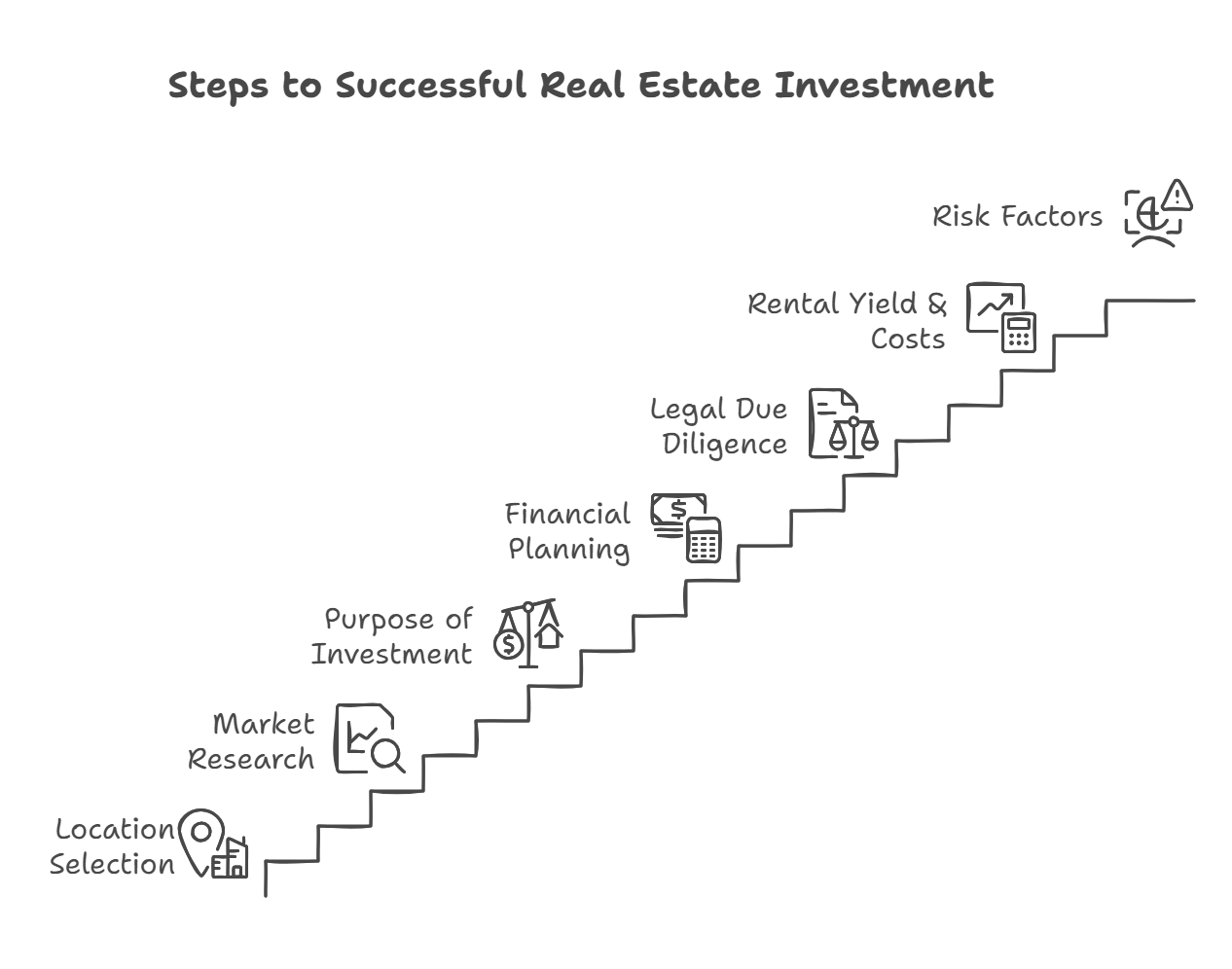Investing in Real Estate
Real estate investment involves purchasing physical property—land, residential, or commercial buildings—with the intention of generating returns through rental income, resale profits, or business use.
Types of Real Estate Investments:
- Residential Real Estate – Includes houses, apartments, villas, and condominiums.
- Commercial Real Estate – Offices, retail spaces, and shopping malls used for business purposes.
- Industrial Real Estate – Factories, warehouses, and manufacturing units.
- Raw Land Investment – Buying land for future development or resale.
- Real Estate Investment Trusts (REITs) – Indirect investment in real estate through publicly traded funds.
Example:
- An investor purchases an apartment and rents it out, earning monthly rental income.
- Over time, as property values rise, they sell the property at a profit.
1. Key Benefits of Investing in Real Estate
Real estate offers several advantages compared to stocks, bonds, and mutual funds:
1.1 Stable & Predictable Income
- Rental properties generate consistent monthly income.
- Ideal for retirement planning and financial security.
1.2 Capital Appreciation
- Property values generally increase over time, leading to higher resale profits.
- Urban areas and locations with high demand see faster appreciation.
1.3 Inflation Hedge
- Unlike cash, real estate retains value during inflation.
- As living costs rise, property values and rental income also increase.
1.4 Leverage Opportunities
- Investors can buy property with a mortgage (loan) while benefiting from capital appreciation.
- Example: A ₹50 lakh property purchased with ₹10 lakh down payment increases by ₹10 lakh in value, leading to a 100% return on the down payment.
1.5 Tax Benefits
- Home loan interest deductions under Section 24 of the Income Tax Act.
- Principal repayment deductions under Section 80C.
- Depreciation deductions reduce taxable rental income.
1.6 Diversification & Portfolio Security
- Real estate provides stability to an investment portfolio by reducing reliance on stocks and bonds.
- Unlike stocks, property values do not fluctuate daily, making real estate a safer investment.
2. Basic Considerations Before Investing
2.1 Location Selection
- Proximity to workplaces, schools, hospitals, and transport hubs increases property value.
- Areas with upcoming infrastructure projects see higher appreciation.
- Avoid overdeveloped or remote locations where property demand is low.
2.2 Market Research
- Analyze current property prices, rental yields, and demand trends.
- Compare with historical price trends to estimate future appreciation.
2.3 Purpose of Investment
- Rental Income – Focus on properties with high occupancy rates and tenant demand.
- Resale Value – Choose locations with fast-growing property values.
- Commercial Use – Ensure business viability and foot traffic.
2.4 Financial Planning & Loan Options
- Home Loans: Most buyers finance real estate through banks and NBFCs.
- Interest Rates: Check current rates (floating vs. fixed).
- Loan-to-Value (LTV) Ratio: Banks usually offer 80-85% financing, requiring a 15-20% down payment.
2.5 Legal Due Diligence
Before purchasing property, verify:
- Title Deed: Ensures the seller has legal ownership.
- Encumbrance Certificate: Confirms there are no legal disputes or unpaid dues.
- Approval from Local Authorities: Ensure proper zoning and approvals for construction.
2.6 Rental Yield & Maintenance Costs
- Rental Yield Formula: = (Annual Rent / Property Value) × 100
- A higher rental yield (above 3-5%) is considered profitable.
- Consider maintenance, property taxes, and repair costs before investing.
2.7 Risk Factors
- Illiquidity: Selling property can take months or years.
- Market Fluctuations: Property prices can decline due to economic downturns.
- Regulatory Changes: Government policies on taxes and land use impact real estate values.
Conclusion
Real estate is a long-term wealth-building strategy that provides stable income, tax benefits, and asset appreciation. However, location, financing, and legal aspects must be carefully evaluated before investing.
Key Takeaways:
- Choose high-demand locations with future growth potential.
- Analyze rental yields and resale value before buying.
- Understand home loan financing & tax benefits to maximize returns.
- Verify legal documents to avoid disputes and ownership issues.
By making informed decisions, investors can build a profitable and secure real estate portfolio.


No Comments